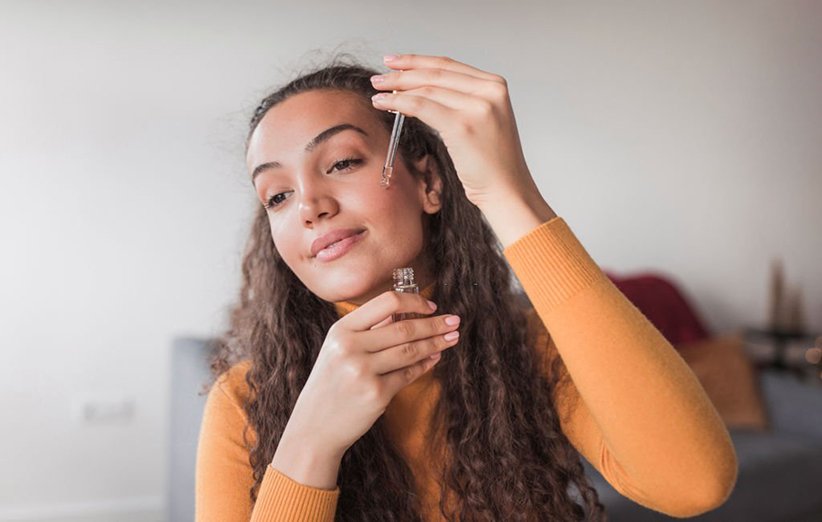7 Unparalleled Oils for Dry Skin and How to Use Them
Posted by HOOMAN MORADTALAB

7 Unparalleled Oils for Dry Skin and How to Use Them
Both facial skin and other parts of the body require moisture and hydration to stay healthy. When the skin lacks sufficient moisture, it becomes dehydrated. As a result, you may experience problems such as itching, flaking, dullness, and the development of wrinkles and fine lines.
Natural oils are an excellent choice for maintaining moisture, especially during cold and dry seasons. Today's article introduces 7 types of oils specifically for dry skin. Stay with us.
Why is hydration crucial for the skin?
Did you know that keeping your skin clean and hydrated is the first step towards having healthy and radiant skin? Your skin acts as a protective barrier, preventing the entry of microbes, pollutants, harmful chemicals, and even damaging radiation into your body. If your skin is dehydrated, the compromised function of this protective barrier allows external substances to penetrate into your body.
Maintaining skin hydration is important for preserving its microbial flora and, consequently, preventing skin conditions such as acne. Moreover, dehydrated skin is more sensitive to sunlight and may develop wrinkles and fine lines earlier than other types of skin.
When exposed continuously to sunlight, wind, or other environmental factors, your skin loses moisture. On the other hand, the production of natural oils in the skin decreases with age. Using non-comedogenic oils from natural sources creates a protective layer on your skin, helping to maintain its elasticity and radiance.
What is the best oil for dry skin?
Using oil is an excellent way to restore moisture to dry skin. Some plant-based oils have anti-inflammatory and antioxidant properties that can improve the health of the skin's protective barrier (the outermost layer of the epidermis). This effect is particularly important for individuals with dry skin because the skin's protective barrier aids in moisture retention. If you have dry skin, you can use the following oils:
1.Coconut Oil

Coconut oil is ideal for both the skin and hair, especially in tropical regions where this fruit grows abundantly.
Benefits
Coconut oil is rich in lauric acid, which possesses antibacterial, anti-inflammatory, and antioxidant properties. This oil protects the skin from sun damage and acts as an excellent moisturizer for inflamed skin conditions.
Coconut oil can be used to treat minor cuts, burns, and soothe skin conditions like eczema. However, it is recommended that individuals with skin conditions consult a dermatologist before using it.
How to Use
It is best to use pure and organic coconut oil to prevent any negative effects from impurities that may be present on the skin.
To use coconut oil, apply a small amount to clean and dry skin. You can use this oil as a moisturizer and makeup remover for your face.
If you are using coconut oil for the first time, patch test it on your arm to ensure you are not sensitive to it. If your skin shows no reaction after 24 hours, you can proceed to use the oil.
If your skin is sensitive or prone to quick pore clogging, it is better to avoid using coconut oil. Additionally, if you have a significant amount of acne or blackheads on your face, refrain from using coconut oil.
2.Olive Oil
When it comes to body oils, olive oil is one of the most popular choices mentioned. As the name suggests, this oil is derived from olives. It is recommended to use extra virgin olive oil for your skin.
Benefits
Olive oil has anti-inflammatory and antioxidant properties. It helps in treating excessive itching and dryness of the skin and is beneficial in combating fine lines and wrinkles on the face. You can even use extra virgin olive oil around your eyes. This oil is often used for infant massage as well.
How to Use
If you want to maintain the moisture of your skin, it is best to apply olive oil immediately after a bath. Depending on the climate and the condition of your skin, you can use olive oil every day. However, be careful not to overdo it and clog your skin pores. If you have excessively oily skin or are prone to acne, it is better to avoid daily use of olive oil. Additionally, if you have atopic dermatitis (eczema), olive oil may not be a suitable option for you as it can worsen your symptoms.
3.Almond Oil

Sweet almond oil works wonders for dry and damaged skin, promoting its repair and rejuvenation. This oil has medicinal properties and has been used in traditional medicine for centuries.
Benefits
Almond oil is rich in fatty acids, vitamin E, vitamin A, and zinc. It not only hydrates the skin but also helps improve wound healing and maintain the skin's protective barrier function. Sweet almond oil combats inflammation, oxidative stress, and skin damage caused by sunlight. It reduces lines, wrinkles, and skin creases, and brightens the appearance of scars. Under the supervision of a physician, the use of sweet almond oil can relieve itching associated with eczema and psoriasis.
How to Use
To moisturize the skin, simply apply a small amount of almond oil to your face in gentle circular motions. You can use this oil around your eyes and even rejuvenate cracked lips.
To brighten sun-tanned skin, mix almond oil with a few drops of lemon juice and a little honey. You can also use a mask made from almond oil and sugar to exfoliate dead skin cells. Almond oil is suitable for all skin types due to its lightweight and non-comedogenic nature. However, if you have a sensitivity to nuts, it is better to avoid topical application of almond oil.
4.Argan Oil
Argan oil has numerous benefits for hair and skin. This oil is extracted from the fruit of the argan tree, which is native to Morocco. Argan oil has cosmetic and therapeutic properties and is commonly used in skincare products.
Benefits
The lipids present in this oil form a protective layer on the skin, enhancing the skin's barrier function and preventing water loss.
Argan oil reduces sebum activity and controls oily skin, making it suitable even for individuals with oily skin. It possesses anti-acne and anti-aging properties and aids in wound healing. During pregnancy, you can massage argan oil onto your abdomen to prevent the formation of stretch marks.
How to Use
You can use argan oil as a day cream or a night cream. You can even apply makeup after using this oil.
Cleanse your face, dispense a few drops of argan oil onto your palm, and gently massage it onto your facial skin. It is best to use argan oil immediately after bathing. Argan oil is suitable for all skin types. However, individuals with nut allergies may be sensitive to argan oil. Before using this oil for the first time, perform a patch test on your arm with a small amount to ensure that your skin does not react to it.
5.Grape Seed Oil

Grape seed oil, a lightweight oil, is used in many skincare products.
Benefits
Grape seed oil is rich in omega-6 fatty acids, vitamin E, and polyphenols. Using this oil helps moisturize the skin and reduces hyperpigmentation, inflammation, redness, and premature signs of aging.
How to Use
Experts recommend using cold-pressed grape seed oil. You can apply this oil directly to your skin or combine it with other oils or moisturizing agents. Anyone can use this oil topically unless they have a sensitivity to it. It is advisable for individuals with blood disorders or those scheduled for surgery to avoid using grape seed oil.
6.Jojoba Oil
Jojoba oil is derived from the seeds of the jojoba plant, which grows in Arizona, Southern California, and parts of Mexico. Due to its stability and long shelf life, jojoba oil is used in skincare products.
Benefits
Jojoba oil is rich in waxy esters that protect your skin against dehydration. The esters present in this oil closely resemble sebum, the natural oil produced by the skin. Therefore, this oil is suitable for most skin types.
Jojoba oil helps in skin rejuvenation, has antimicrobial and anti-inflammatory properties, and has been traditionally used for treating skin conditions such as acne and eczema.
How to Use
Jojoba oil is an ideal choice as a massage oil. You can use it alone or mix it with a few drops of peppermint oil to relax your mind and body. Jojoba oil is also combined with eucalyptus oil for pain relief. Additionally, you can mix it with bentonite clay to create an acne-fighting mask.
7.Avocado Oil
Avocado oil has gained popularity in the skincare industry due to its high vitamin E content.
Benefits
The vitamins and minerals present in avocado oil moisturize and nourish the skin. This oil soothes inflammation and itchiness, aids in wound healing, reduces sunburn, and strengthens nails.
How to Use
To moisturize the skin, a few drops of avocado oil are sufficient. Additionally, adding a few drops of avocado oil to bathwater helps soften and smoothen the skin.
You can apply the inner part of the avocado peel onto your face and rinse it off with warm water after 10 to 15 minutes. Follow up with a moisturizer for a radiant complexion.
Final Words
Incorporating natural oils into your skincare routine can bring remarkable changes to the appearance and health of your skin. Most people can benefit from using topical oils; however, it's advisable to perform a patch test by applying a small amount of oil to a small area of your arm or leg before proceeding. This will help ensure that you don't have any sensitivities to the oil. If you are sensitive to oils or have a specific skin condition, consult with a physician to assist you in selecting the appropriate oil.



